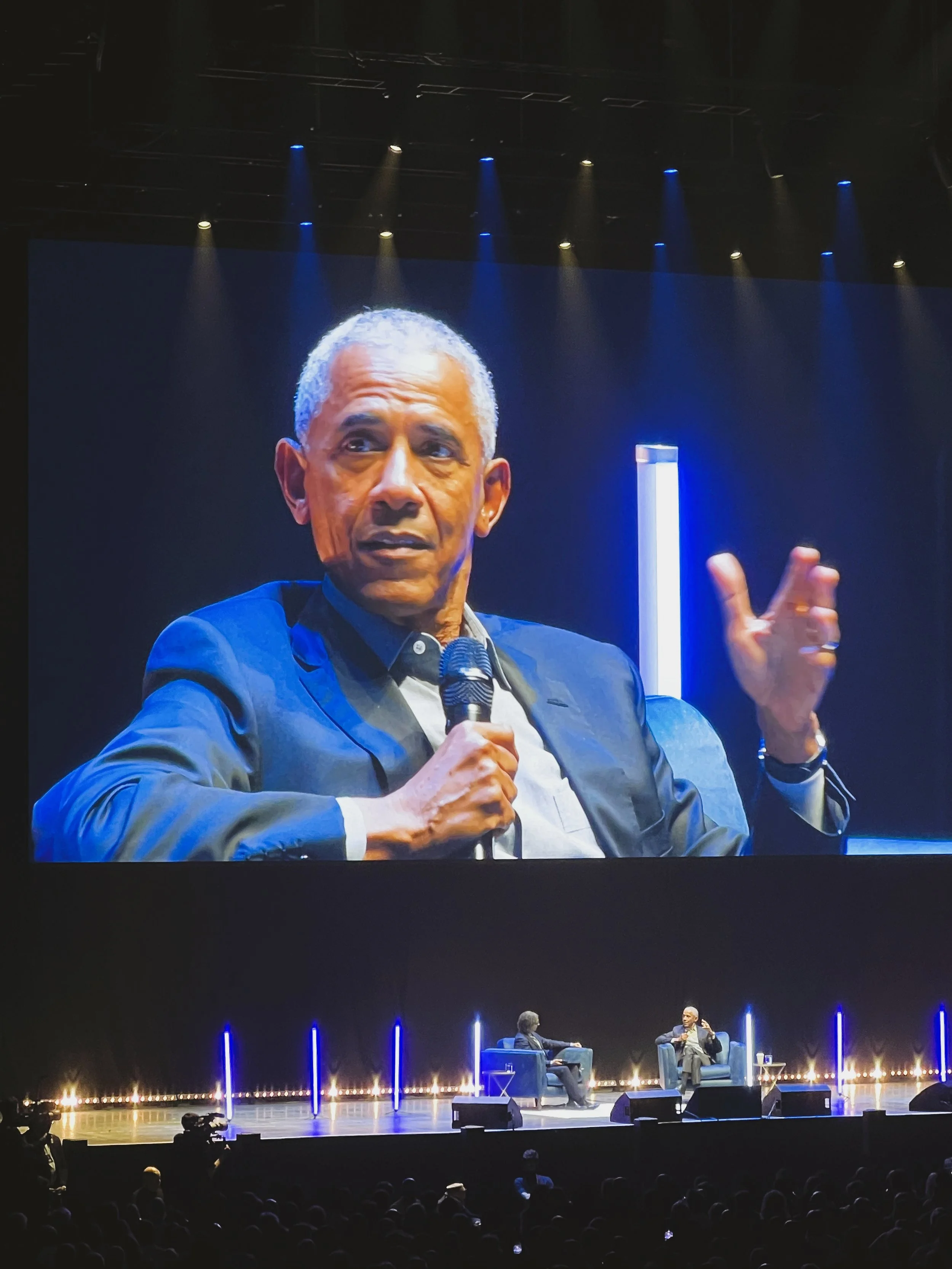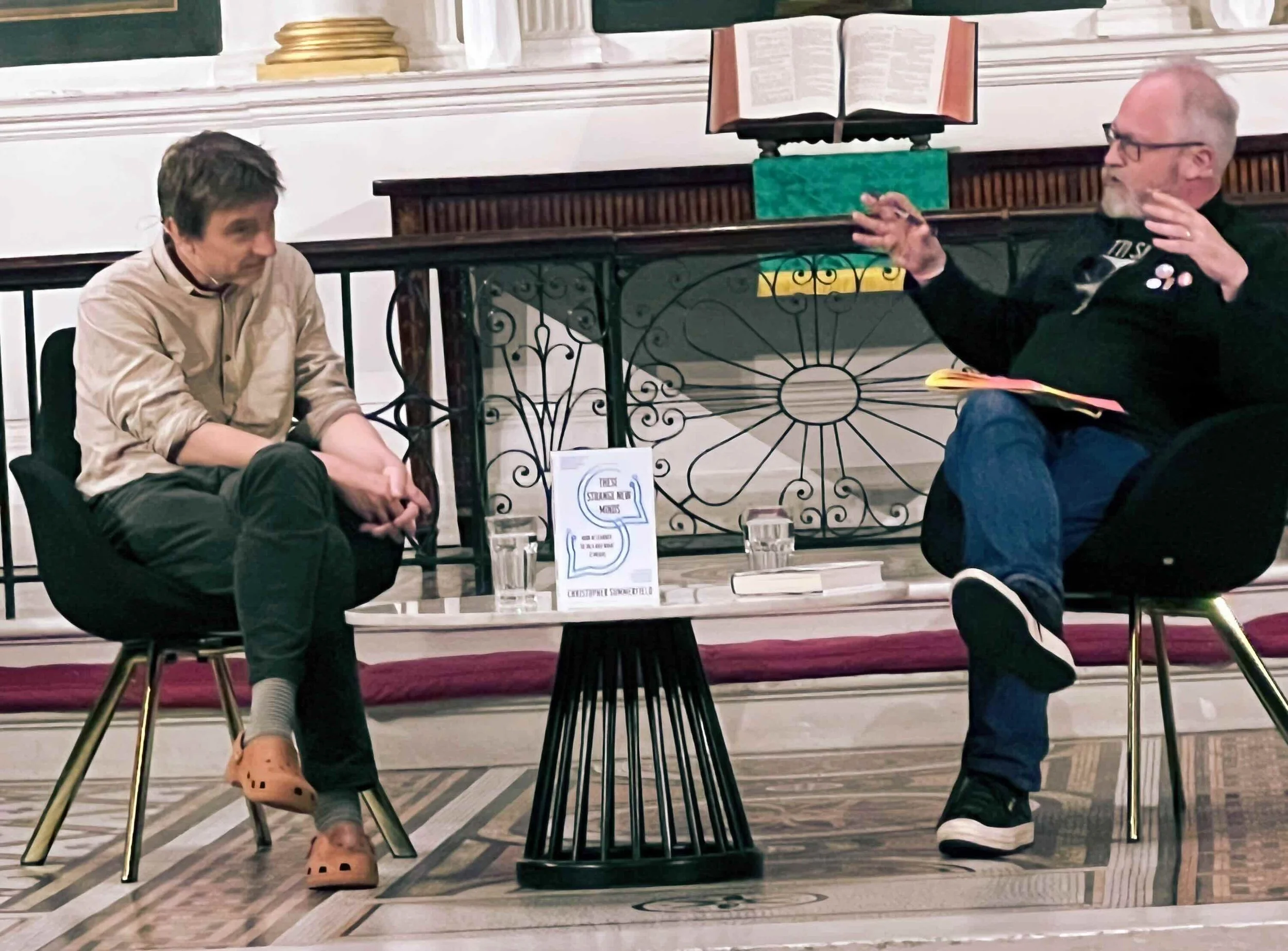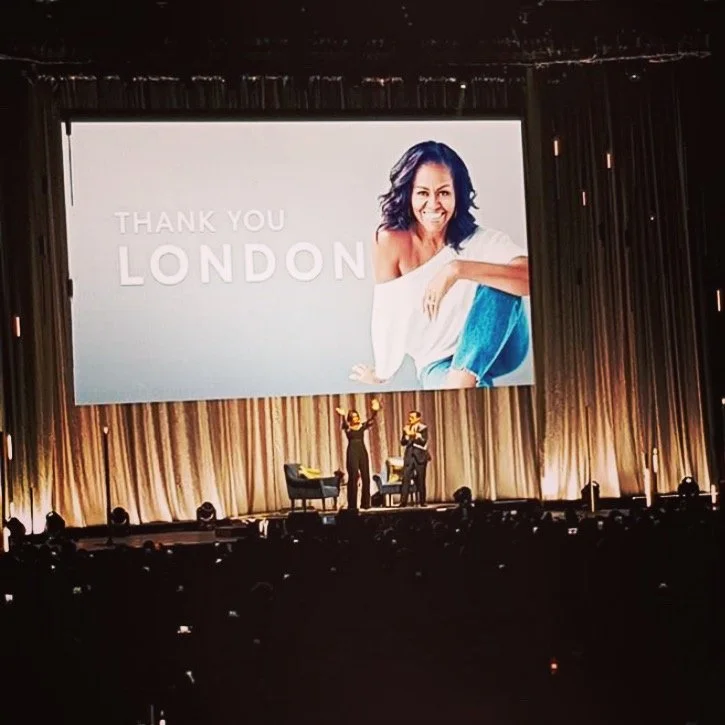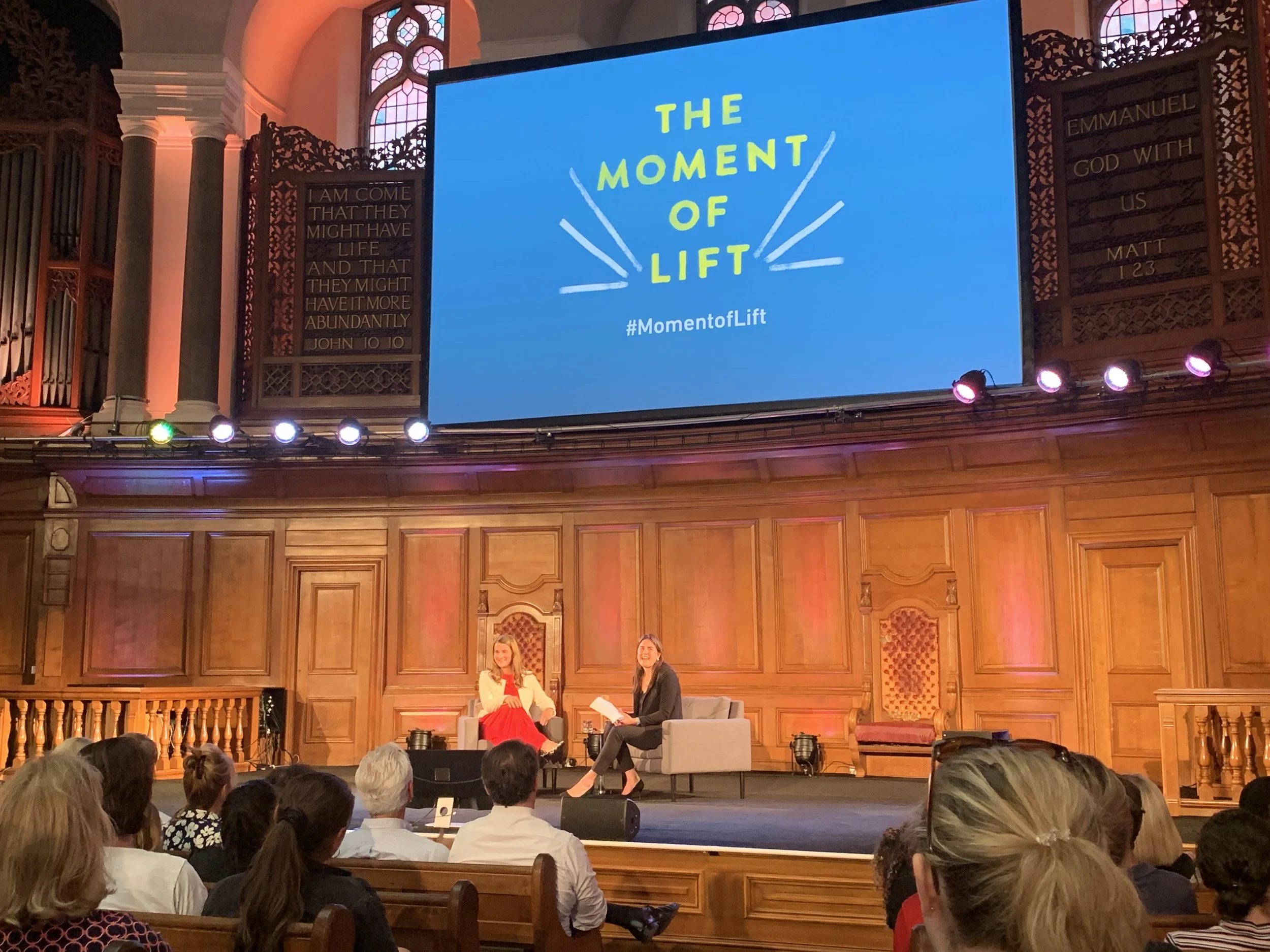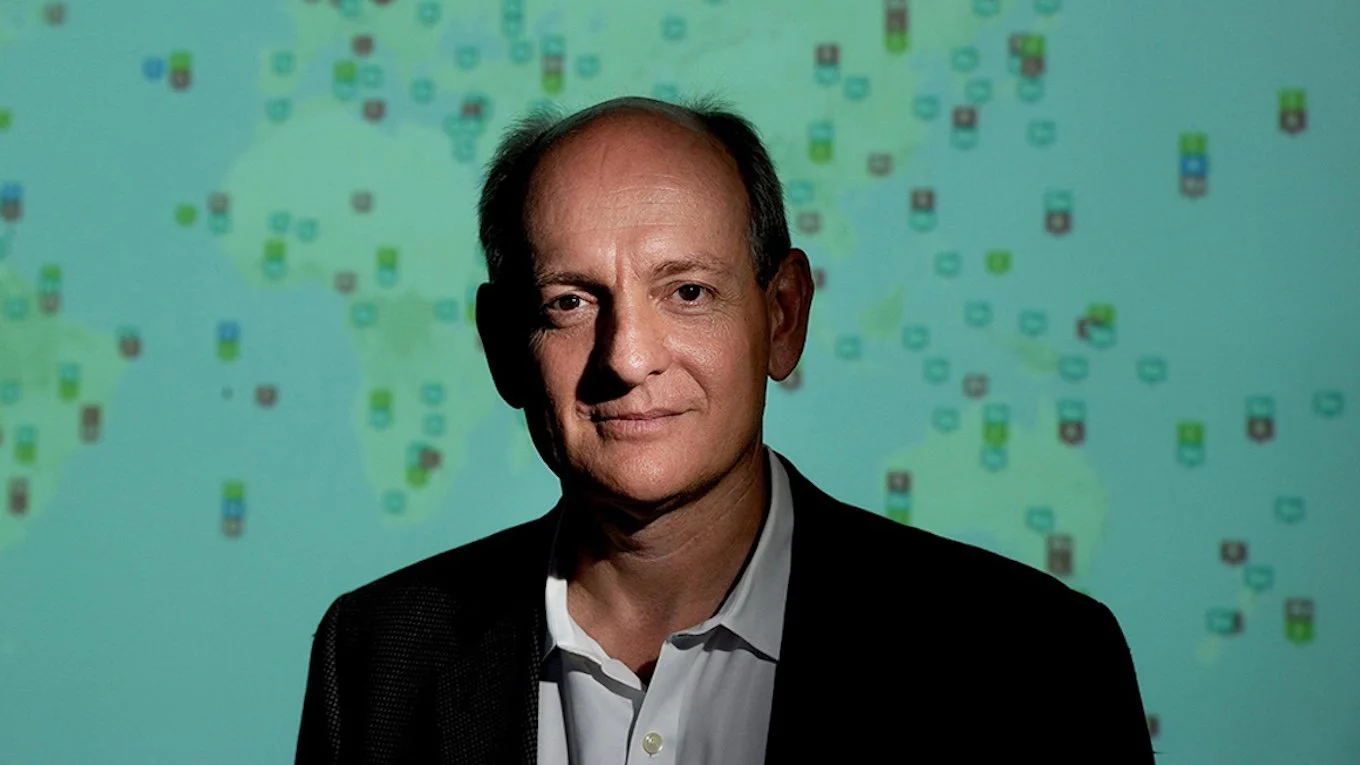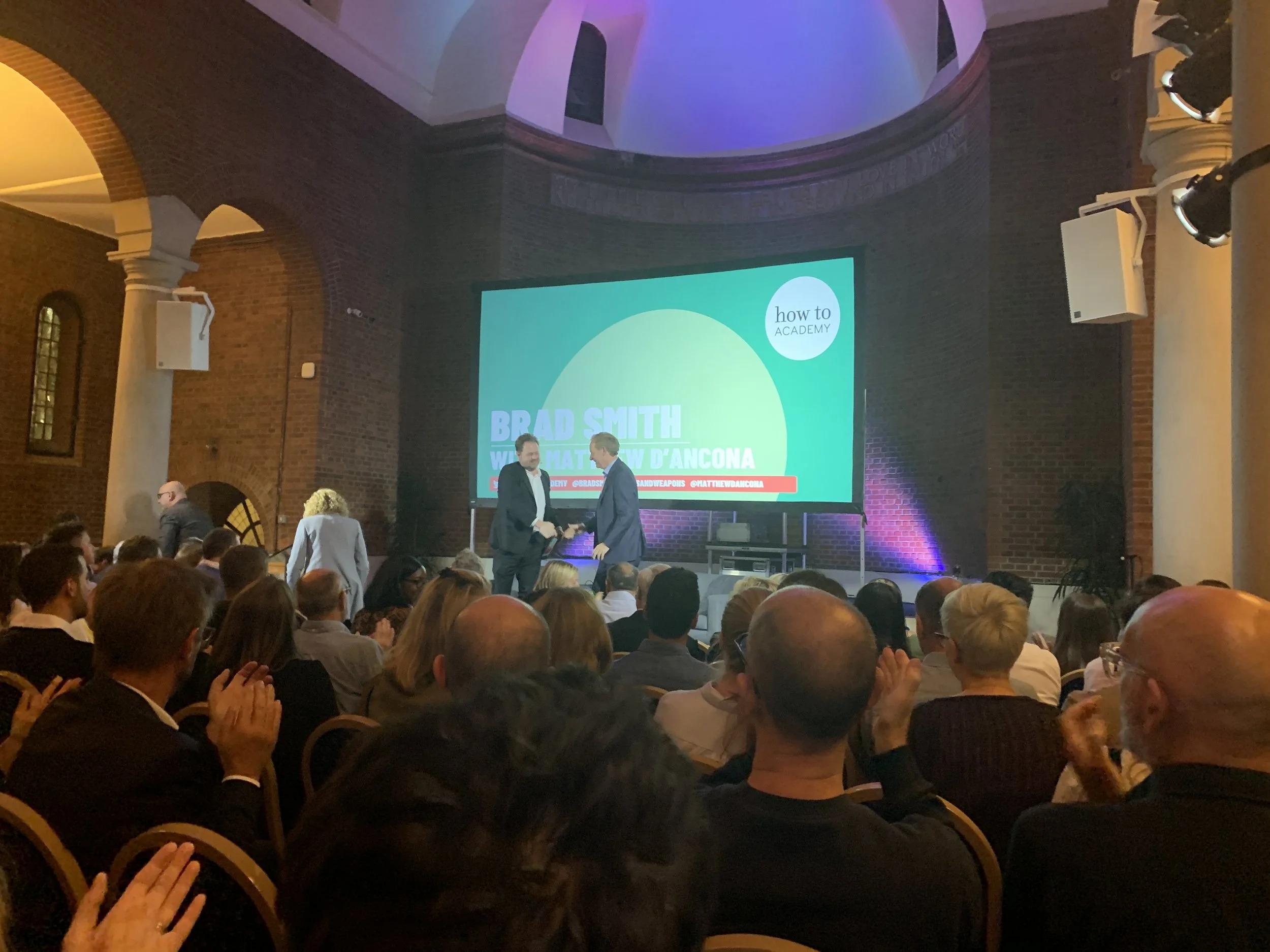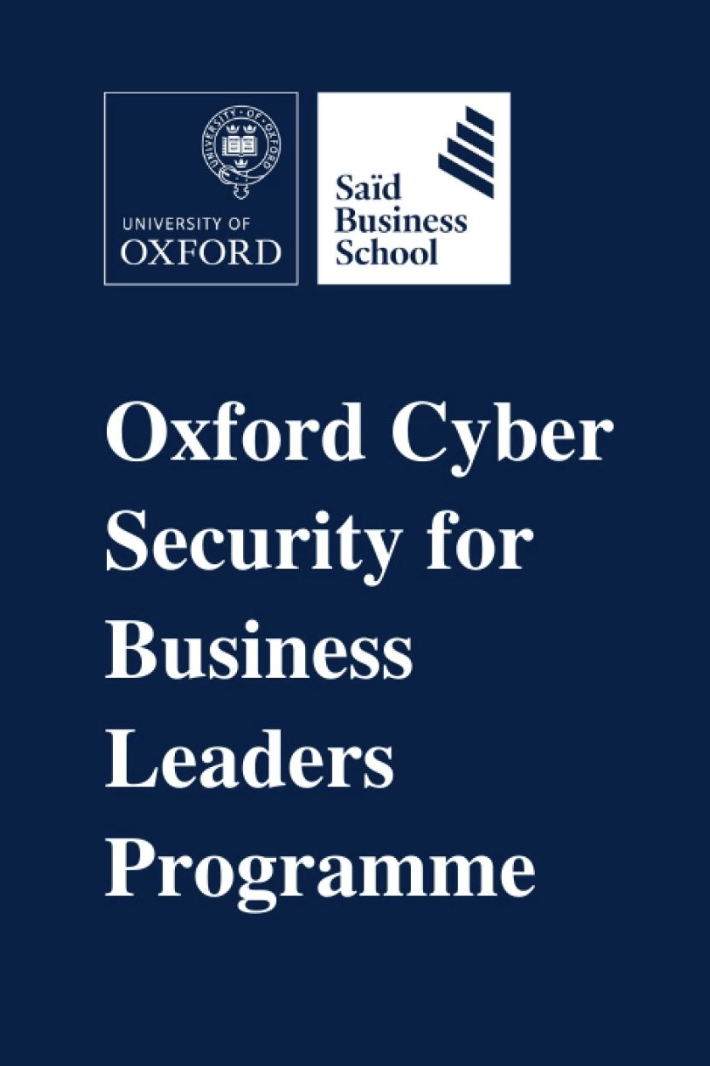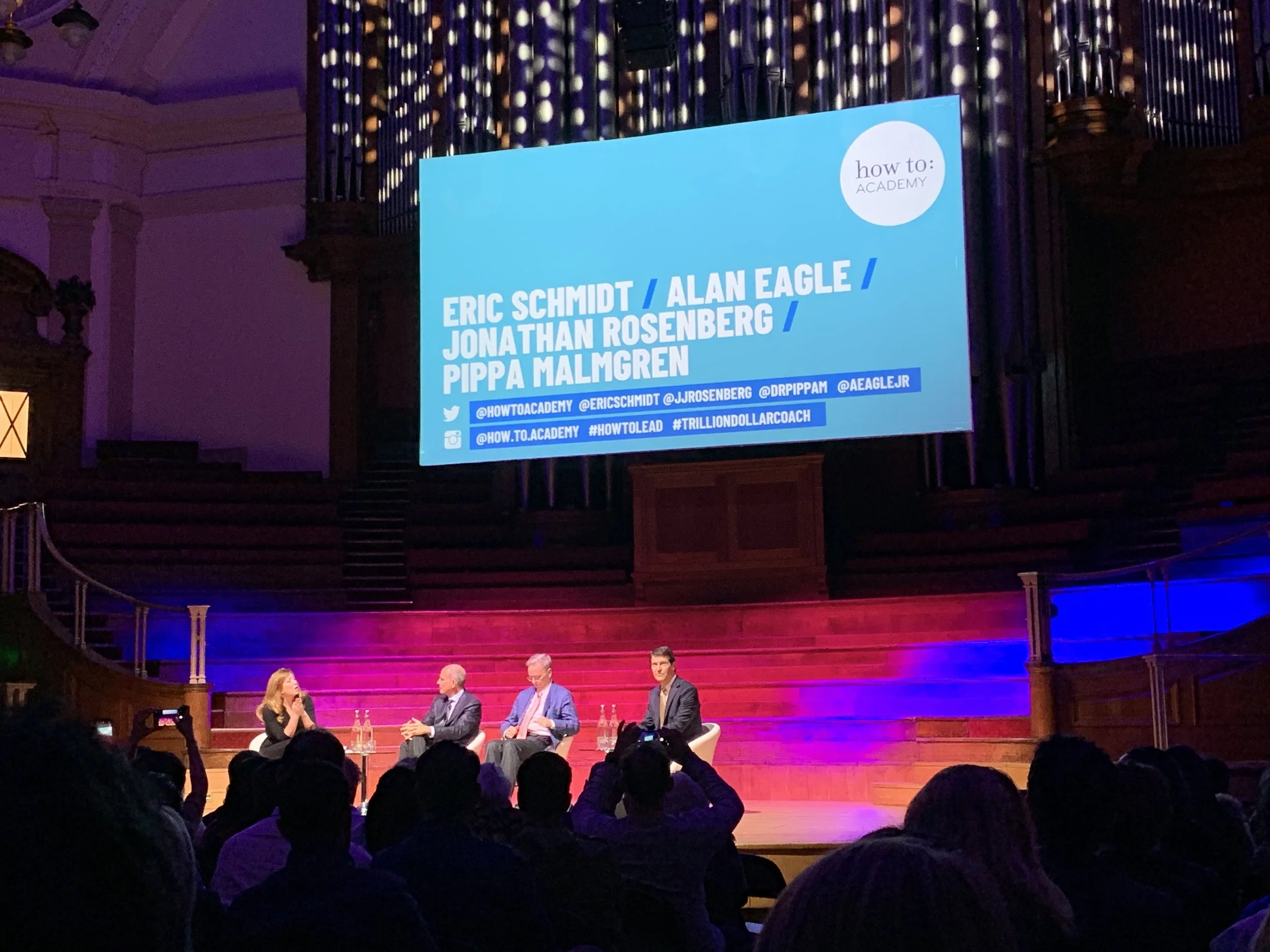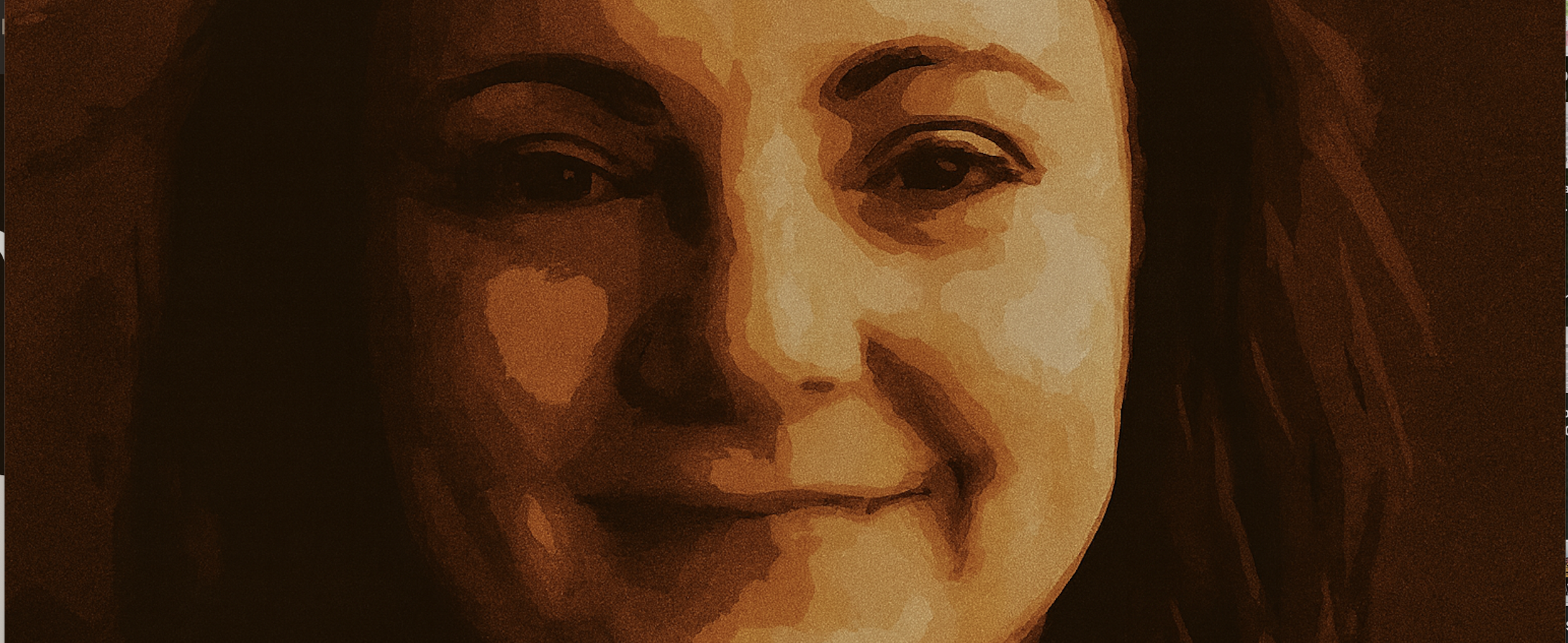
What’s Been Going On Behind the Scenes
Samantha’s News
An Evening with Barack Obama
Not your average Wednesday. I had the chance to hear Barack Obama in conversation with historian David Olusoga. Leaving politics at the door, two of his themes really stuck with me because of how relevant they are to business today.
The first was values-based leadership. He described it as “our salvation”, the idea that purpose and principles aren’t nice-to-haves, they’re what keep organisations and societies steady when everything else feels in flux. It was a reminder that values aren’t soft; they’re structural.
The second was AI and the future of work. He compared its impact to the arrival of electricity: transformative, full of potential, but equally full of risk. From medical breakthroughs to job disruption, his point was that creativity remains hard to automate, but predictable, repeatable roles will be the first to change. He also flagged that we’re barely having the bigger conversation - how AI forces us to reimagine work itself, and the safety nets around it.
For leaders, the challenge isn’t spotting the technology, it’s shaping the conditions for people to thrive through disruption.
These Strange New Minds: An Evening with Christopher Summerfield
Last night I found myself trekking through a very damp London evening to a church in Clerkenwell, not the usual venue for an AI discussion, but somehow perfect. The pews were full, the heating very questionable, and at the front sat Christopher Summerfield (ex-DeepMind, now Oxford University and the UK AI Safety Institute) with comedian Robin Ince as moderator, which is as fascinating a pairing as it sounds.
Summerfield was discussing his book These Strange New Minds: How AI Learned to Talk and What It Means, and the conversation ranged from what makes intelligence intelligent to whether we’re handing over too much agency to machines. The best line of the night: “If AI is going to decide more on our behalf, what are we unwilling to delegate?”
It wasn’t the usual glossy tech event, no slides, no jargon, just a few big questions echoing off old stone walls. I left thinking less about algorithms and more about control.
As ever, my photos were terrible. We’ll call this one “artistic blur” with proof of attendance.
Imagining the Future with Nick Foster
I had the chance to hear Nick Foster speak on his new book Could, Should, Might, Don’t: How We Think About the Future. With a career that’s spanned Google, Sony, Nokia, Apple and Dyson, he knows a thing or two about designing for what’s next. What really struck me was how he framed those four words as the “territory” of future thinking. It made me realise how often, in business, we cling to past data because it feels rational and safe, yet the future never follows a neat dotted line on a chart.
Nick also challenged the casual way organisations use words like “better.” Corporate strategies are littered with them, but rarely pause to define what better actually means. Everyone carries a different picture of what “better” looks like, yet strategy often assumes we’re aligned. Add to that our natural pull towards familiar patterns because our brains light up the same way when imagining the future as when remembering the past, and it’s easy to see why companies get stuck.
His message was to treat the future as a process, not a destination. Change is rarely dramatic or overnight. More often it’s the slow, everyday graft of turning “could” into “will.”
I left with a reminder that transformation isn’t about selling a glossy version of the future, it’s about helping people live into it, one ordinary step at a time.
A Day at the BMW PGA Championship at Wentworth
We recently spent a day at the PGA Golf Championship at Wentworth and one of the highlights was watching the fantastic Justin Rose in action. I’ve always admired the way he carries himself, both on and off the course. He’s the definition of composure under pressure, with a discipline and mental focus that you can actually see in real time as he plays.
What really stands out though, is that his lessons go far beyond golf. Listening to him talk about preparation, mindset, and handling pressure is just as relevant to business and life as it is to the fairway. He comes across as a genuinely classy, decent guy, which is why I’m such a big fan.
A nice coincidence: my partner works at Morgan Stanley, who sponsor Justin Rose. But golf loyalties aside, I think anyone who gets the chance to hear him speak will come away with insights they can apply well beyond the sport.
Back to School (Cambridge Style)
I’ve recently started the Executive Education Programme at Cambridge Judge Business School: Mastering Change Management, Building Resilient and Adaptable Organisations.
It’s a six week course I’m doing alongside my day-to-day, designed to sharpen how leaders approach change with confidence, clarity, and compassion.
What I love about it so far is the balance between theory and practical, real-world application. We’re diving into everything from the psychology of how people respond to change, to the role of culture, power dynamics, and the pressures organisations face in an era of constant transformation. It’s not just “academic”, it’s very grounded in today’s realities of digital disruption, AI, and ESG.
For me, that connects directly to what I’ve always believed: change isn’t an occasional project, it’s the day job. I’m excited to see how this programme stretches my thinking and adds even more tools to how I approach transformation.
An Evening with Michelle Obama
Getting a ticket for this one felt like a victory in itself as the online queue was endless, and I’d missed out on seeing her on another occasion because I just couldn’t get tickets. This time, I wasn’t going to let it pass me by.
Former first-lady Michelle Obama, in conversation with Stephen Colbert at the O2 Arena, was every bit as inspiring as I hoped it would be and then some.
I’d seen the two of them together before on his show, so I already knew they had great rapport. I’d also read Becoming already before the event, and caught plenty of interviews, but hearing her talk about it live, in front of thousands, was something else entirely.
It was a very different setting from many of the more intimate events I usually go to, but Michelle Obama completely lit up the room. For what was essentially a book talk, she held the stage like few people can. The atmosphere was electric, and honestly, I think the audience would happily have stayed for hours more just to keep listening.
The photo I managed to snap on the night doesn’t do it justice, dark lighting in the O2 and a quick grab in the moment (I hate being that person with a phone up at events). But the memory more than makes up for it.
Hearing from Melinda French Gates
I had the chance to attend an “In Conversation” event with Melinda Gates at the Emmanuel Centre in London, where she spoke about her book The Moment of Lift. I hadn’t had much of an opportunity to hear her speak before. What struck me most wasn’t just the importance of her message, that when we lift up women, we lift up humanity, but the way she delivered it. She came across as warm, open, and genuinely committed to the stories she shared.
Listening to her reflections on women she’s met through her work, and on her own journey, was both inspiring and grounding. It reminded me how much change starts with empathy, connection, and courage and how important it is to use our voices for progress.
Stuart Russell on the Future of AI
Another after-work jaunt to hear the extraordinary computer scientist, Stuart Russell in conversation with journalist Farhad Manjoo at the Royal Institution. It was one of those evenings that made me sit back and think hard about the bigger picture of AI, and I’m also a big fan of the RI as a venue so it was a double win.
For context: Stuart Russell is one of the world’s leading experts on artificial intelligence, a professor of computer science at UC Berkeley, and author of Human Compatible. It’s a book that’s shaped so much of the debate on AI ethics and safety. Farhad Manjoo is a technology journalist and opinion columnist at The New York Times, known for questioning the cultural and political impact of Silicon Valley. Together, they made a fascinating pairing: the academic who’s shaping the theory, and the journalist who’s challenging the narrative.
Russell has this ability to take complex, often intimidating ideas about AI and make them feel both urgent and human. He spoke about the opportunities, yes, but also the risks: how AI isn’t just about what machines can do, but about what happens when their decisions ripple through society. Hearing that balance between optimism and caution felt really important.
What I enjoyed most was the way he framed AI not as some distant, futuristic concept, but as something already shaping how we live and lead. For me, it was a reminder that the future of AI isn’t only technical; it’s ethical, political, and deeply personal.
I walked out of that room both energised and a little uneasy -which, I think, is exactly the point.
Ever the learning nerd, I took part in the Oxford Leading Sustainable Corporations Programme which is an executive-level course designed for leaders to look hard at how businesses respond to sustainability.
For me, it was a chance to hear the case studies from some increbible leaders and , and to share ideas with other participants. What stuck with me wasn’t just the big themes (climate risk, governance, and the “people, profit, planet” triple bottom line) but to actually have conversations on what sustainability means in practice, and how it’s reshaping the way organisations are run.
My biggest takeaway? Sustainability changes how leaders make decisions, how companies create value, and ultimately how they survive the future. It’s both a challenge and an opportunity, and it’s not going away.
Sustainability at the Top Table
Microsoft’s Brad Smith on Tech and Humanity
I raced through rush-hour London this evening to hear Microsoft’s President, Brad Smith, speak on Tech and the Future of Humanity. I hadn’t heard him talk before, so I was curious and he didn’t disappoint.
He talked about the idea that it’s not just about what technology can do, but what it should do. The tension between innovation and impact came through strongly: how do we balance progress with ethics, privacy, human rights, and society at large?
Interesting to hear the way he framed technology as part of the bigger human story, not simply as tools for profit, but as something that shapes who we are and how we live. The audience questions dug into that too: what does “future of humanity” actually mean when tech is woven into every corner of our lives?
For me, it reinforced a belief that technology isn’t neutral. It defines the world we build, the pace we move, and the choices we make along the way. Hearing Brad Smith explore that whether it was from the speed and scale of AI to the responsibilities of business and government was thought-provoking, and a reminder that leadership in tech has to be as much about values as it is about innovation.
Studying Cybersecurity in a Time of Change
I’ve just completed Oxford University’s Saïd Business School executive programme Leading Cybersecurity for Business Leaders. For me, it was inspired by the work I was doing at Exabeam and seeing companies talking about transformation in technology and especially relating to cyber, while hearing so many conversations about what security leadership really needs to be.
What struck me most on this course was listening to directors and senior leaders talk about how they view governance, risk, and the scale of the cybersecurity challenge. It confirmed what I’d already thought I knew: security isn’t just an IT issue, it’s a business issue. It cuts across how organisations are governed, how they innovate, and how they prepare for the future.
The programme was practical too. I worked on a major project around security strategy, governance, and risk and landed a course distinction at the end of it which was a bonus.
Looking back, it wasn’t just about technical frameworks. It was about mindset: reframing cybersecurity as something embedded in leadership and decision-making.
Leadership, Presence, and Language with L. David Marquet
I went along to hear L. David Marquet, author of his new book Leadership is Language, and honestly, it was one of those talks that just stays with you.
If you haven’t encountered him before, he’s a retired US Navy Captain. I love his book “Turn The Ship Around!”, it’s an iconic leadership book, but I had no idea what he’d be like in person. I’d deliberately avoided podcasts and videos because I wanted that first impression to be first-hand.
The event itself was surprisingly intimate, a small room, not a grand stage, but Marquet’s presence filled it completely. He has that rare quality where the way he speaks just holds everyone. It wasn’t about flashy delivery or over-polished slides; it was about clarity, conviction, and making you think differently about what leadership actually means.
For me, it was a reminder that real leadership isn’t loud, it isn’t about having all the answers, it’s about the language we use, the choices we make in the moment, and how we invite others to step up. I left with my brain buzzing and a smile on my face. Do check out his books!
Google Tech Giants Talk Coaching and Leadership
This evening’s event featured Google’s Eric Schmidt, Jonathan Rosenberg, and Alan Eagle in conversation with Dr. Pippa Malmgren.
Organised by the How To Academy. I’m a big fan of the events they put on in London.
Eric Schmidt, of course, is best known as the former CEO and Executive Chairman of Google, where he helped shape the company into a global giant. Jonathan Rosenberg was Google’s longtime head of product, and Alan Eagle worked alongside both as a communications executive and co-author. Together, they’ve written a book called Trillion Dollar Coach, capturing the lessons they learned from Silicon Valley and from legendary mentor Bill Campbell. Pippa Malmgren brought her own unique perspective as an economist and former presidential adviser, steering the conversation with energy and insight.
What made this event so engaging was the mix of personal stories and practical advice. They spoke about leadership as something grounded in values, trust, and culture, rather than just strategy or scale. Hearing them reflect on Google’s journey, the successes and the mistakes, felt refreshingly candid.
For me, it was a reminder that leadership isn’t about having all the answers. It’s about surrounding yourself with the right people, being open to change, and creating an environment where others can thrive. And, if the evening proved anything, it’s that lessons from Silicon Valley don’t just stay there, they resonate far beyond.
Hillary & Chelsea Clinton Share the Gutsy Women Who Inspire Them
I was invited along as a plus-one for this event to see Hillary Rodham Clinton and Chelsea Clinton at the Southbank Centre talk about their book The Book of Gutsy Women. I thought it might be interesting to hear more about the women whose stories are in the book, and also to see the mother-daughter dynamic live on stage.
They were interviewed by scholar Mary Beard, that made it extra interesting as someone who brings seriousness, curiosity, and depth, someone used to historical stories and women’s voices.
Even though the lighting was dim, and the photo I got was another “grabbed mid-moment” (you know, me trying to be discrete, but still wanting to capture something).
William Gibson and the Uneven Future
My latest visit was to the Southbank Centre to hear William Gibson in conversation with David Rowan, at the launch of his novel Agency. Gibson is best known for the line: “The future is already here, it’s just not evenly distributed.” It’s a quote that has followed him for decades, because it captures something that still feels so true today.
What struck me most hearing him live was how he talks about the future not as prediction, but as reflection. His stories don’t try to tell us what’s coming next, they hold up a mirror to the present. Agency dives into alternate timelines, quantum possibilities, and AI characters that feel both unsettling and oddly familiar. The message is less about science fiction and more about the world we’re already living in.
I love hearing thinkers like Gibson. It’s not about answers or forecasts, it’s about stretching how we see the moment we’re in, and noticing the uneven ways the future is already unfolding around us.
Another high quality photo from this event! But still it captures “a moment”.
